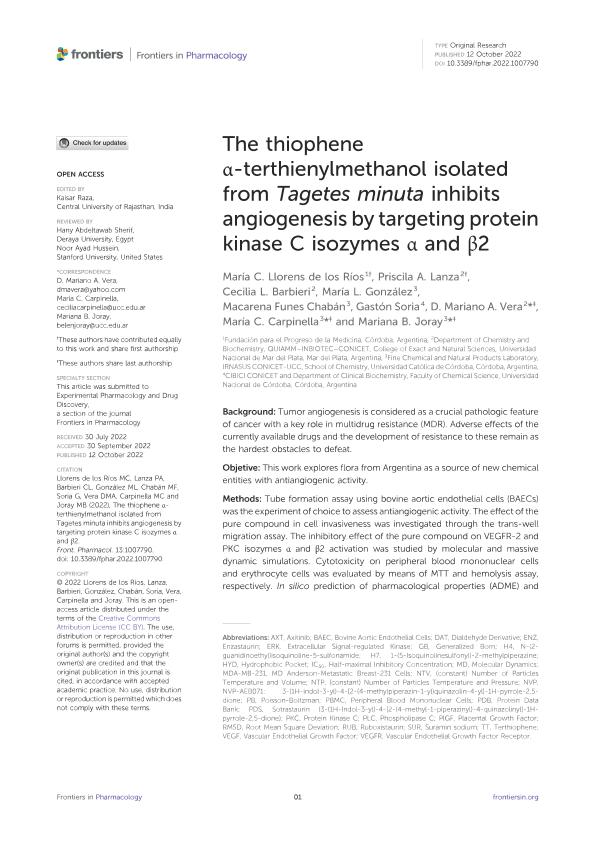Artículo
The thiophene α-terthienylmethanol isolated from Tagetes minuta inhibits angiogenesis by targeting protein kinase C isozymes α and β2
Llorens de los Ríos, María C.; Lanza Castronuovo, Priscila Ailin ; Barbieri, Cecilia Luján
; Barbieri, Cecilia Luján ; González, María L.; Funes Chabán, Macarena
; González, María L.; Funes Chabán, Macarena ; Soria, Gastón; Vera, Domingo Mariano Adolfo
; Soria, Gastón; Vera, Domingo Mariano Adolfo ; Carpinella, María C.; Joray, Mariana Belén
; Carpinella, María C.; Joray, Mariana Belén
 ; Barbieri, Cecilia Luján
; Barbieri, Cecilia Luján ; González, María L.; Funes Chabán, Macarena
; González, María L.; Funes Chabán, Macarena ; Soria, Gastón; Vera, Domingo Mariano Adolfo
; Soria, Gastón; Vera, Domingo Mariano Adolfo ; Carpinella, María C.; Joray, Mariana Belén
; Carpinella, María C.; Joray, Mariana Belén
Fecha de publicación:
10/2022
Editorial:
Frontiers Media
Revista:
Frontiers in PharmacologY
e-ISSN:
1663-9812
Idioma:
Inglés
Tipo de recurso:
Artículo publicado
Clasificación temática:
Resumen
Background: Tumor angiogenesis is considered as a crucial pathologic feature of cancer with a key role in multidrug resistance (MDR). Adverse effects of the currently available drugs and the development of resistance to these remain as the hardest obstacles to defeat.Objetive: This work explores flora from Argentina as a source of new chemical entities with antiangiogenic activity.Methods: Tube formation assay using bovine aortic endothelial cells (BAECs) was the experiment of choice to assess antiangiogenic activity. The effect of the pure compound in cell invasiveness was investigated through the trans-well migration assay. The inhibitory effect of the pure compound on VEGFR-2 and PKC isozymes α and β2 activation was studied by molecular and massive dynamic simulations. Cytotoxicity on peripheral blood mononuclear cells and erythrocyte cells was evaluated by means of MTT and hemolysis assay, respectively. In silico prediction of pharmacological properties (ADME) and evaluation of drug-likeness features were performed using the SwissADME online tool.Results: Among the plants screened, T. minuta, showed an outstanding effect with an IC50 of 33.6 ± 3.4 μg/ml. Bio-guided isolation yielded the terthiophene α-terthienylmethanol as its active metabolite. This compound inhibited VEGF-induced tube formation with an IC50 of 2.7 ± 0.4 μM and significantly impaired the invasiveness of bovine aortic endothelial cells (BAECs) as well as of the highly aggressive breast cancer cells, MDA-MB-231, when tested at 10 μM. Direct VEGFR-2 and PKC inhibition were both explored by means of massive molecular dynamics simulations. The results obtained validated the inhibitory effect on protein kinase C (PKC) isozymes α and β2 as the main mechanism underlying its antiangiogenic activity. α-terthienylmethanol showed no evidence of toxicity against peripheral blood mononuclear and erythrocyte cells.Conclusion: These findings support this thiophene as a promising antiangiogenic phytochemical to fight against several types of cancer mainly those with MDR phenotype.
Archivos asociados
Licencia
Identificadores
Colecciones
Articulos(INBIOTEC)
Articulos de INSTITUTO DE INV. EN BIODIVERSIDAD Y BIOTECNOLOGIA
Articulos de INSTITUTO DE INV. EN BIODIVERSIDAD Y BIOTECNOLOGIA
Articulos(IRNASUS)
Articulos de INSTITUTO DE INVESTIGACIONES EN RECURSOS NATURALES Y SUSTENTABILIDAD JOSE SANCHEZ LABRADOR S.J.
Articulos de INSTITUTO DE INVESTIGACIONES EN RECURSOS NATURALES Y SUSTENTABILIDAD JOSE SANCHEZ LABRADOR S.J.
Citación
Llorens de los Ríos, María C.; Lanza Castronuovo, Priscila Ailin; Barbieri, Cecilia Luján; González, María L.; Funes Chabán, Macarena; et al.; The thiophene α-terthienylmethanol isolated from Tagetes minuta inhibits angiogenesis by targeting protein kinase C isozymes α and β2; Frontiers Media; Frontiers in PharmacologY; 13; 10-2022; 1-18
Compartir
Altmétricas



